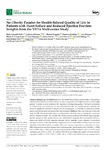No obesity paradox for health-related quality of life in patients with heart failure and reduced ejection fraction: insights from the VIDA multicenter study

Ver/
Use este enlace para citar
http://hdl.handle.net/2183/40928
A non ser que se indique outra cousa, a licenza do ítem descríbese como Creative Commons Attribution 4.0 International License (CC-BY 4.0)
Coleccións
- Investigación (FCS) [1293]
Metadatos
Mostrar o rexistro completo do ítemTítulo
No obesity paradox for health-related quality of life in patients with heart failure and reduced ejection fraction: insights from the VIDA multicenter studyAutor(es)
Data
2024-12-12Cita bibliográfica
Cassadó-Valls P, Enjuanes C, Anguita M, Formiga F, Almenar L, Crespo-Leiro MG, Manzano L, Muñiz J, Chaves J, Hidalgo E, Ramos-Polo R, Yun S, José-Bazán N, Moliner P, Comín-Colet J. No obesity paradox for health-related quality of life in patients with heart failure and reduced ejection fraction: insights from the VIDA multicenter study . J Clin Med. 2024 Dec 12;13(24):7558.
Resumo
[Abstract] Background and Objectives: Previous studies showed that, paradoxically, obese patients with heart failure (HF) have better clinical outcomes compared to overweight, normal, or underweight patients. Scientific societies emphasize the importance of integrating quality of life (QoL) assessment in cardiovascular care. However, the association between QoL and weight remains understudied. Given the significant correlation between HF survival and QoL, it is essential to assess how obesity impacts patient-reported outcomes in this clinical setting. Methods: This cross-sectional multicenter study in 1028 HF patients with reduced ejection fraction (HFrEF) aims to evaluate the association between obesity and QoL, and whether the obesity paradox holds for HF patients regarding QoL. Specific and generic QoL questionnaires were administered alongside clinical parameters like body mass index (BMI) and body adiposity estimator (BAE). Results: Obese compared to non-obese reported worse QoL. In the adjusted linear regression models, neither BMI nor obesity were associated with QoL. Generalized additive models confirmed a strong non-parametric association between BMI, subdomain scores from Kansas City Cardiomyopathy Questionnaire (KCCQ) (OSS p = 0.004, CSS p = 0.006, TSS p = 0.02), and summary measurements of EQ-5D (EQ-5D index p = 0.003, visual analogue scale (VAS) p = 0.01). In contrast, BAE showed a statistically significant linear relation among QoL (OSS p ≤ 0.001, CSS p ≤ 0.001, TSS p ≤ 0.001) and EQ-5D summary measurements (EQ-5D index p ≤ 0.001, VAS p ≤ 0.001). Conclusions: Overall, obese patients have worse QoL; therefore, obesity cannot be considered a protective factor in terms of QoL in established HF.
Palabras chave
Body adiposity estimator
Body mass index
Health-related quality of life
Heart failure
Obesity
Patient-centered health outcomes
Body mass index
Health-related quality of life
Heart failure
Obesity
Patient-centered health outcomes
Versión do editor
Dereitos
Creative Commons Attribution 4.0 International License (CC-BY 4.0)
ISSN
2077-0383






